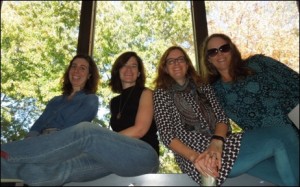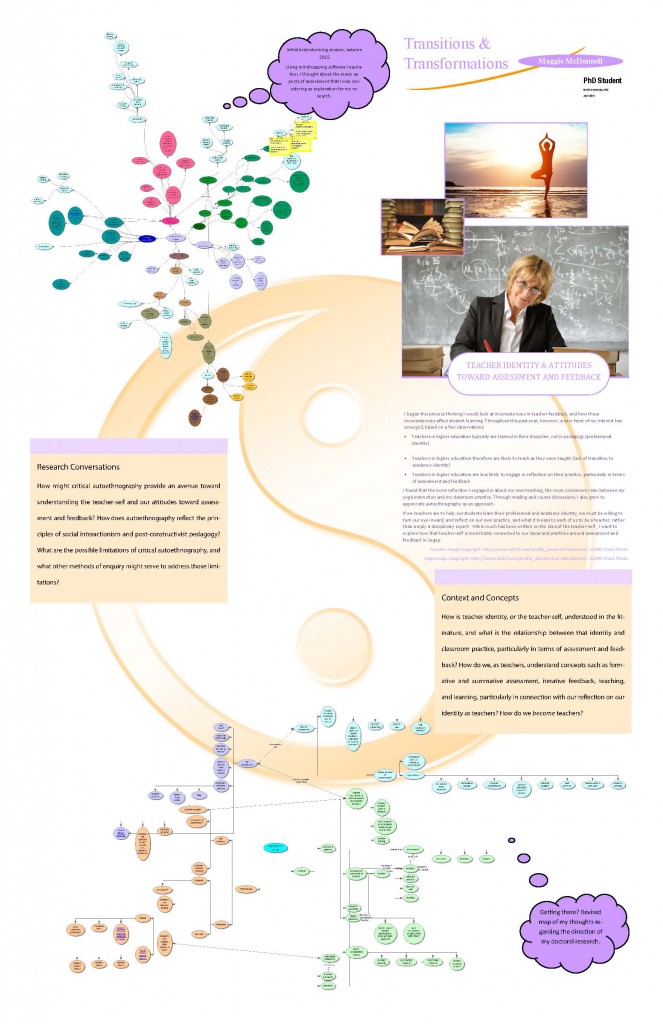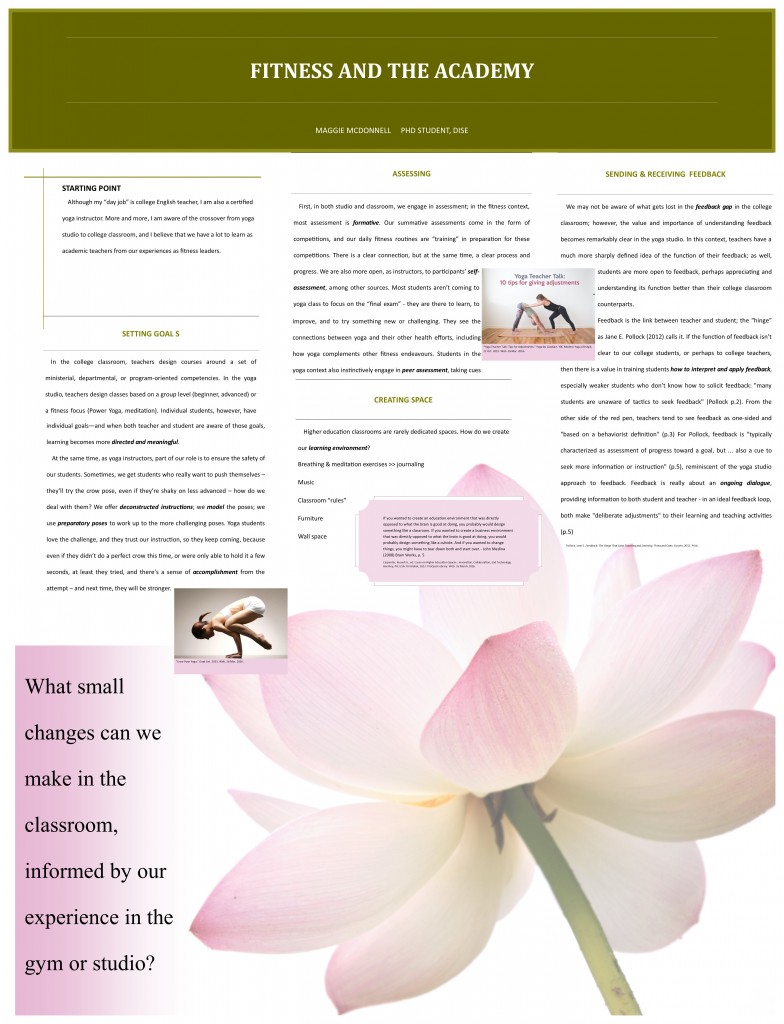
Sara Doody, Sarah Marshall, Maggie McDonnell, and Erin Reid
On October 17, we presented the following to our PhD Colloquium group at McGill, and we thought that we’d bring it to a larger audience. We’re in our second year together as doctoral students, and we’re spending a lot of time reflecting on our development as doctoral students, researchers, and writers. We have been meeting as a writing group for about a year now, and plan to continue together at least as long as the PhD journey keeps us writing, if not beyond. We’ve all contributed to this text, so it is heteroglossic[1], although it’s worth noting that we have all nodded vigorously along as we each discussed our personal experience, as we planned the text.
Social Isolation (Sarah M) – next year we will have finished all our course work, so we will have no reason to actually see and be with anyone else in our DISE cohort. Here’s a nice quote from The Guardian Higher Education blog:
All PhDs are solitary affairs. When you carry out doctoral research you are, by definition, the only person working on the precise topic of your thesis. There will be others whose research is closely related to yours, but nobody else is doing quite what you are doing. In this sense, all PhDs are solitary affairs. (July 2014)
All of us are writing in isolation it would seem, but to use a metaphor, I see it as we’re like bees in a beehive. Each worker bee has their own hexagonal cell to look after, but in a beehive each bee, while working on their own cell, is also a part of the whole hive, as it is with us PhD students: we are a part of a bigger group. By participating in the writing group we are able to break the illusion of being alone – we are not alone. Not only are we writing with others in academe, but with our classmates we are at approximately the same phase of the process. Sure some are a bit ahead (preparing CPs) and others are not there yet (working towards preparing CPP), but we are all PhD3 in DISE.
One could argue that the construction of the author as an isolated producer of texts is only sensible if one takes a very limited, object centred, view of writing practice. The understanding of writing as process, as communication, and as therapy, cannot be supported by the concept of the isolated writer (Pheby 2010).
Society uses a convention that often shows writers, alone in their office or den, slaving away over an unfinished manuscript until – ta-da – it is finished; completely perfect and whole like the Virgin Birth. In my experience it couldn’t be further from the truth – writing is as collaborative as it is generative.
Renegotiating Identity (Erin) – Being a writing group member has allowed me to renegotiate my relationship to not only to writing, but also to my identity as a writer. Throughout my education, I was encouraged, largely implicitly, to view writing as a solitary activity…something that was best done in isolation, with the focus entirely on the finished product. Although writing was something to which I always felt drawn, it was often a site of intense personal stress for me. I struggled to see myself as a legitimate writer/scholar…I was constantly wracked with what I eventually named my CSD (crippling self-doubt). This struggle intensified dramatically when I found myself in graduate school as an MA student in Religious Studies where the long-standing meme of the solitary, struggling, silent and hopefully brilliant writer was in full force. Though the graduate students may have enjoyed some camaraderie in sharing an office and at times writing in the same space, work was never shared, only our anxiety. There seemed to me to be a direct correlation between the most stressed out student and the most brilliant – writing the bulk of my MA in 3 horrible weeks was a badge of honour for me as it was proof that the frustrated, procrastinating, blocked-yet-brilliant artist model was alive and well. But that process was so painful that it literally led to me being unable to move my head due to compressed vertebrae in my cervical spine. It took me at least a year to heal from writing my MA.
It shouldn’t be too difficult to understand why developing a new, healthier relationship to writing was one of the main reasons I decided to return to academia. I needed to find a better way to write, and a way to allow myself to identify as a writer; in short, I needed desperately to develop “new habits of the mind” (Spigelman, 1999). Writing groups have been transformational for me as the process of working with, responding to, and eventually collaborating with my peers has allowed me to identify myself increasingly as a practitioner, rather than simply a learner. As we began to share our work, we developed our skills in critical reading, editing, and giving feedback, which in turn have led to a growing sense of confidence in academic selves, something that Kamler and Thomson (2007) have referred to as ‘discursive social practice.’ Finally, writing groups allow us to identify ourselves as a member of a writing group facilitates our identifying ourselves of a larger peer community (Maher, 2008).
Assumptions – What’s Out There? (Sara D) I have always found writing groups incredibly rewarding. I’ve spent a lot of time in them, and have experienced the “Shut Up and Write”, the peer review, and the roundtable (where you read a paper at home and come prepared to give feedback). You could say that I am a serial “Writing Groopie[2]”.
There is a common assumption of writers as isolated. Writing is often pushed into the margins and talked about as something you do “after” all of the hard work has been done. It is something you share only after it has been “perfected”, so it can be scary just talking about writing. The dominant assumption of writing seems to be that we have to work alone to craft the perfect text before we even think about sharing with others.
Writing groups are really useful vehicles for subverting these popular assumptions about writing. Scholars exploring doctoral writing groups assume that writing is a social practice. Whenever we write, we write to someone, and writing groups make this sociality visible. This is especially true of writing in academe, where we are trying to figure out how to write to a larger community of scholars and peers. As Anthony Paré (2014) writes, writing groups provide a space for us to learn how to participate in these conversations. Writing groups provide us with opportunities to explore how to give feedback and experiment with thinking and arguing like a scholar. He also believes “opening one’s mouth to speak in the doctorate…[is] fraught with danger” (p. 25). What we write and how we write it affects the ways in which we are viewed by our communities. While we learn how to speak from supervisors, writing groups provide a safer environment to test out ideas, ways of talking, and ways of writing (Guerin, 2014; Paré, 2014; Starke-Meyerring, 2014).
Reflexive Strategies (Maggie) We want to wrap things up with some ideas for how to get the most out of a writing group, based partly on what we’ve experienced, and partly on the ideas of those who have come before us.
Our group meets once a week – many groups meet less frequently, but we’re using the weekly appointment as a way of keeping ourselves connected to the habit of public writing. Typically, we use the Pomodoro method, so in our two-hour session, we write in 25-minute sessions, taking a short break to chat, or share bits of our writing. More recently, especially as we worked on grant applications and candidacy papers, we decided to dedicate one session each month to a share-and-respond session, wherein we exchange computers and comment in writing on each other’s work. We discuss our comments before we end the session, but we each leave with at least two other people’s feedback recorded in our text, for reflection and reference.
Of course, there are many different writing group formats, and as you might expect, there are a ton of resources for writing groups online, which if nothing else speaks to their effectiveness. Most academic writing groups recommend a few basic tips, which we’ve included below, along with some links to other writing group resources.
One of the tips is to find a common goal. Although we’re all researching different things – Sarah M. is looking at teacher education in physical therapy, Sara D. is writing about doctoral writing, Erin is exploring how religious education can be beneficial in adult language learning, and Maggie is looking at development of teacher identity in higher education – we’ve been writing together for almost a year now. About a month ago, Sara D. had a brilliant idea – we should present on writing groups as part of the colloquium! And then she added the most enticing part: if that works out, we should write a paper.
So now, as well as meeting regularly to work on our own writing, we’re starting to gather our collective thoughts and experiences, in order to write about our group and its impact on our personal doctoral journeys. When Sara began looking into writing groups, she found a great deal written from the perspective of those who encourage us to form groups, but only one written from the perspective of an actual group member (Maher, Seaton, McMullen, Fitzgerald, Otsuji, & Lee, 2008). So we thought that we should write and share, so others can benefit from this strategy. Since we still have some time before we get to the end of this particular journey, we’re not rushing to write this paper, but we’re gathering thoughts and reflections in preparation.
One of the methodologies we’ve begun using, then, is a form of reflexive memo. At the beginning of each session, we take five minutes to write about what we’re hoping to work on, our personal goals, and our feeling about the session. Then at the end of the session, we take another five to ten minutes to reflect back on the session. Over time, we will collect these, and collectively reflect on the reflections, so we can see how the group is working for us collectively and individually.
You can also use memoing with a writing group as another way of recording reactions to and reflection on each other’s work (Qualley & Chiseri-Strater, 1994), not to mention record and reflect on your own progress. Whether you use memos specifically or not, finding a way to engage in collective reflexivity can help improve your writing and your morale (Barry et al, 1999).
| Tips | Our experience & commentary |
| Have a group goal & shared interest/connection | As Sarah M points out, we are all PhD3 students at McGill’s DISE, so we have a few things in common, even if our personal research interests are different. Having said that, we have found that within our research, there’s plenty of crossover, and we often end up sparking ideas in each other, and recommending readings.
|
| Be prepared to commit long-term (at least one term) | We’ve been writing together since last year, and this year, we decided to continue, for as long as we can.
|
| Be exclusive – 4 to 7 people is typically regarded as ideal | We are currently four, although once in a while, someone else has sometimes joined us. It’s not always easy to find a regular time that’s good for everyone, so the group sort of ends up limiting itself.
We do think it’s important to feel comfortable with the rest of the group; after all, these people are going to be reading and commenting on your work. You should feel trust and kinship.
|
| Share or delegate administrative tasks | Inevitably, these will come up – who’s responsible for booking a room? Is really the only one we’ve encountered so far, although there was a lot of emailing to set things up. We’ve never really worried about a leader, as things just seem to naturally fall into place.
|
| Find a good space & time | We’ve tried a few places. We had a few good sessions at Thompson House, but now we find that it gets pretty loud, so we’ve moved to the McLennan library. Remember that you’ll need a space that works for writing, above all – desks or tables are probably necessary, and, given how many of us write exclusively electronically, access to outlets might be a consideration.
|
Determine which model works best for everyone
|
We use the Pomodoro method, and we set aside one session each month for a read & comment session. |
| If you’re using a presenter model, set up a schedule ahead of time |
|
Feedback:
|
This is really crucial – we really get a lot out of our feedback sessions, and it’s nice to hear from everyone, rather than just one view.
We pass our computers to each other, rather than read to each other, so we can make comments on each other’s texts, and then have a record of the feedback as we move forward. |
References & Resources:
Barry, C. A., Britten, N., Barber, N., Bradley, C., & Stevenson, F. (1999). Using Reflexivity to Optimize Teamwork in Qualitative Research. Qualitative Health Research, 9(1), 26-44.
Golde, C. M. (n.d.). Tips for Successful Writing Groups. Retrieved October 11, 2016, from http://chris.golde.org/filecabinet/writegroups.html
Guerin, C. (2014). The gift of writing groups: Critique, community and confidence. In C. Aitchison, & C. Guerin (Eds.), Writing groups for doctoral education and beyond (pp. 128-141). New York, NY: Routledge.
Haas, S. (2014). Pick-n-mix. A typology of writers’ groups in use. In C. Aitchison, & C. Guerin (Eds.), Writing groups for doctoral education and beyond (pp. 30-47). New York, NY: Routledge.
Kamler, B., and P. Thomson. 2007. The failure of dissertation advice books: Towards alternative pedagogies for doctoral writing, Paper presented at annual meeting of AERA, Chicago, April.
Lee, S., & Golde, C. M. (n.d.). Starting an Effective Writing Group. Retrieved October 11, 2016, from https://unmgrc.unm.edu/writing-groups/documents/starting-an-effective-group.pdf
Maher, D., Seaton, L., McMullen, C., Fitzgerald, T., Otsuji, E., & Lee, A. (2008). ‘Becoming and being writers’: The experiences of doctoral students in writing groups. Studies in Continuing Education, 30(3), 263-275.
Paré, A. (2014). Writing together for many reasons: Theoretical and historical perspectives. In C. Aitchison, & C. Guerin (Eds.), Writing groups for doctoral education and beyond (pp. 18-29). New York, NY: Routledge.
Pheby, A. (2010). The myth of isolation: Its effect on literary culture and creative writing as a discipline. Creative Writing: Teaching Theory & Practice, 2(1), 51-58.
Qualley, D. J., & Chiseri-Strater, E. (1994, Winter). Collaboration as Reflexive Dialogue: A Knowing “Deeper Than Reason” Journal of Advanced Composition, 14(1), 111-130.
Spigelman, C. 1999. Habits of mind: Historical configurations of textual ownership in peer writing groups. College Composition and Communication 49, no. 2: 23455
Starke-Meyerring, D. (2014). Writing groups as critical spaces for engaging normalized institutional cultures of writing in doctoral education. In C. Aitchison, & C. Guerin (Eds.), Writing groups for doctoral education and beyond (pp. 65-81). New York, NY: Routledge.
Studying for a humanities PhD can make you feel cut off from humanity. (2014). Retrieved October 19, 2016, from https://www.theguardian.com/higher-education-network/blog/2014/jul/08/humanities-phd-students-isolation
[1] New word for the week! Heteroglossic: from heteroglossia, first coined by Bakhtin, to describe two or more voices within a text.
[2] We’ve contemplating starting our own online groop – a la Paltrow’s Goop – exclusive and curated, but with fewer juice cleanses.

